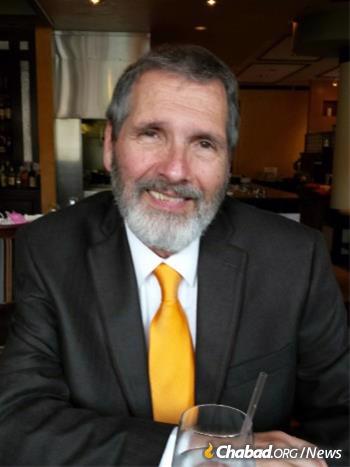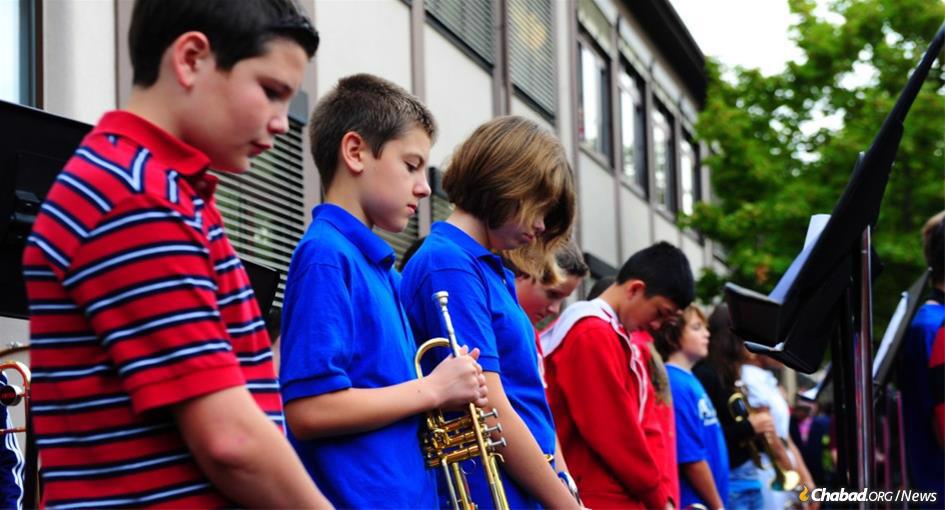Larry Pearson, 77, was ready to settle down and retire a few years ago in the sleepy township of Sparta, N.J., until he read a book that gave him pause and didn’t allow him to rest, compelling him to act. “It all spirals back to The Rebbe,” he says of the bestselling biography by Joseph Telushkin. Pearson picked up the book one day, wanting to learn more about a man who changed the world. Ultimately, he, too, was changed and helped others to change as well.
Pearson, a semi-retired, former Wall Street cotton-exchange executive, read about the approach of the Rebbe—Rabbi Menachem M. Schneerson, of righteous memory— to the societal decay of the 1980s. The Rebbe, diagnosing the matter as a lack of fundamental moral education, suggested a revolutionary solution: a moment of silent reflection, contemplation and introspection, allowing kids to focus on the awareness of a world far greater than themselves.
It’s an idea that has gained national prominence with the recent passage of a Moment of Silence bill in Florida. With the upcoming anniversary of the Rebbe’s passing on 3 Tammuz, corresponding this year to Sunday, June 13, there is a corresponding focus on the Rebbe’s ongoing impact on education and society as a whole.
Highlighting the universal nature of the concept, the Rebbe insisted that parents be the ones who instruct their children regarding what to reflect on during that “Moment of Silence”—and not the school or the teachers—providing parents with a framework for meaningful dialogue with their children. While parents often pack a sandwich for their child’s lunch, he explained, they must also send them off with “spiritual food” as well.
Pearson wasn’t able to just shut the book and continue on with life. He felt a calling. He broached the subject with his rabbi, Mendel Dubov, co-director of Chabad of Sussex County”, N.J., urging that he needed to do something to bring it home to Sparta schools.
But where to begin? Pearson’s first step was canvassing local homes, raising awareness and getting a petition signed. The feedback he received spurred him on.
“Everyone, from religious Catholics to dyed-in-the-wool atheists, was on board,” he tells Chabad.org. “Parents of all backgrounds and ethnicities, rich or poor, have one desire: They want their kids to succeed.”

Winning a Community’s Support
The next step was to bring awareness to the board of education. Standing up before a packed hearing, he presented the case. “Education is nothing more than a foundation; kids have to be put on the right path. One minute gives them a world. They are more than themselves,” he says, focusing on the many positive outcomes of silent reflection, among them, mental-health benefits and meaningful engagement with parents. Research cited by the CDC shows that increased parent engagement in schools is linked with better student behavior, higher academic achievement and enhanced social skills.
“They were impressed, but not about to do anything,” he reports.
Not allowing that to stop him, he joined the ad hoc Sparta Cultural Education Committee, which makes recommendations to the board of education. There were about 25 people on the committee, “each with their own ideas,” but Pearson made his voice heard. Along the way, he garnered support from influential community leaders, both religious and secular. “The former mayor gave his encouragement,” he says.
For a week in March, local schools held a trial-run for the Moment of Silence with educators, parents and children giving positive feedback. In September, the committee will come to a final decision, and Pearson is optimistic that it will be implemented. “Everyone recognizes the benefits,” he says.
Although a moment of silent reflection is a universal idea with no religious connotations, it was Pearson’s spiritual life that pushed him to run with the idea. Raised in a home where religion was an occasional afterthought (topped off with jelly doughnuts and potato latkes), Pearson led a comfortable secular lifestyle. “Sandy Koufax did more for my Jewish identity than anything else,” he muses. “I knew I was a Jew; I had a Jewish identity.”

Ten years ago, Pearson was at the doctor’s office for a routine check-up. “He looked at me and asked if my wife was home, adding, ‘You’re in the middle of a heart attack.’ ” That was July. In September, he decided he needed to go to synagogue. “I called the local shuls and tried to buy a ticket, but I couldn’t afford their prices. After a friend told me about Chabad, I figured I’d give it a shot. I called, and the rabbi said ‘Just show up!’ ”
Impressed by the accepting and non-judgmental attitude at Chabad of Sussex County, he soon became a regular. “I became close with the rabbi, and now I go to shul every Shabbat and put on tefillin daily. I’m a Jew looking to be Jewish again.”
Pearson’s advice for others wishing to implement the Rebbe’s call for a moment of silent reflection in their area? He suggests persistence and perseverance, along with G‑d’s help. “Take that first step. You will be impressed by what you discover. Go and see the feedback; I would be surprised if it isn’t positive.”









Start a Discussion